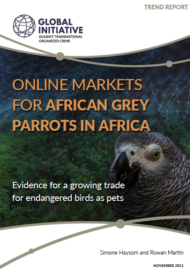Posted on 11 Nov 2021
The research described in this trend report is a response to concerns raised by the World Parrot Trust (WPT) over the scale and scope of online markets for African grey parrots within range states in Africa. African Grey parrots are popular pets in many countries but international trade in wild African grey parrots is prohibited under multilateral agreements and national laws in some countries.
However, preliminary investigations into advertisements for these birds on Nigerian internet platforms raised concern. Analysis of data from an ongoing project of the Market Monitoring and Friction Unit (MMFU), which focuses on monitoring the online marketing of live endangered birds, revealed an emerging online market for African grey parrots in several African countries.
This report provides evidence that, despite high levels of local and international protection, live sales of this endangered species are being advertised on so-called ‘classifieds platforms’ across the continent, including in countries outside the species’ natural range, and which represent some of the largest and most rapidly developing economies. The study sought not only to highlight specific concerns about the trade in African grey parrots but also to elucidate the dynamics of its international and regional regulation so as to inform targeted engagement and potential action at a malleable stage in market development. A total of 782 online advertisements were identified over a six-month period (October 2020–March 2021), with almost all of them being on classified sites. The high number and frequency of advertisements in Kenya (455) and Nigeria (264) were concerning, and action is urgently needed to address the problem in both countries. Noticing advertisements in countries such as Benin, Ghana, and Angola, even in low numbers, is an early-warning sign of nascent markets elsewhere.
The analysis suggests a rising demand for the species as pets, which traders are seeking to meet. The pattern of these advertisements suggests illegal trade both across borders, contravening agreements under the Convention on International Trade in Endangered Species of Wild Fauna and Flora (CITES) and within countries, contravening national laws. National wildlife authorities are therefore urged to monitor the development of these markets and to take early action to shut down such marketing activities on the implicated platforms.
The MMFU will continue to monitor live-bird markets on the indexed web and social media sites to ensure sustained awareness about this problem and its effects, and engage with the platforms identified in the study to request action to curb the use of their service for this trade. More information about the online trade of endangered bird species will follow as the Unit’s investigations evolve.




